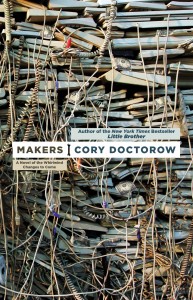In 2013, inspired in part by this post by Julien Smith, I decided to try reading 52 books over the course of the year. I was doing really well for a number of weeks, but then I fell behind, and ended the year with only 21. For 2014, I tried something totally different, and it has worked amazingly well: we’re now halfway through 2014 and I can count 15 books that I’ve finished. More importantly, I can count 61 that I haven’t.
Or, whatever you measure, you will optimize for.
The problem, in 2013, was that I only got points when I finished a book. I had started keeping track of all of the books I finished in a spreadsheet. I wish I’d done this sooner. If you haven’t done this but you wish you had—do it. The feeling won’t go away, and you’ll just feel sillier when you finally do start. If you have kids, start one for them. My old system looked like this:
I remember distinctly one book I picked up in 2013 that was not for me. It was called “Slack”, and I was excited at the possibility that it might help me with introducing more slack into my life, but it was extremely focused on management and it was clear that I wouldn’t be able to get much out of the book. I made a new tab in my spreadsheet called “Dismissed”. Slack is the only book in there, but it was a start.
The problem was twofold:
Laid out explicitly like this, my old tracking schema was quite obviously problematic. » read the rest of this entry »
 I recently started reading Makers by Cory Doctorow. It’s a freaking amazing book. It contains such awesome bits of technology, culture, and psychology. Like, this book seriously satisfies on all levels. Going to have to say it’s one of my favourite books so far. I’m definitely planning to check out more of Cory Doctorow’s stuff… once I get through a bunch of the other books I have to read.
I recently started reading Makers by Cory Doctorow. It’s a freaking amazing book. It contains such awesome bits of technology, culture, and psychology. Like, this book seriously satisfies on all levels. Going to have to say it’s one of my favourite books so far. I’m definitely planning to check out more of Cory Doctorow’s stuff… once I get through a bunch of the other books I have to read.
A realization of…
…has prompted me to seriously reconsider how many books I have on my to-read list. That list grows at a rate of 3-4 per week, which is vastly unsustainable. I need to use more discretion in choosing books. I think I’m going to do a bit of triaging with the ones I currently possess:
I really don’t know what to put in slot #2. It’s like I tell people about humor: there are enough videos on youtube to keep you laughing out loud for the rest of your life, but those videos represent only a tiny fraction of the 15000 hours of video that are uploaded every minute (or whatever the astonishing rate is). Thus, there are videos that are worth watching, and videos that are not… and then, of course, some that you need to watch some of in order to find out. It’s a challenge, in this day and age, not to let quality get diluted by unquality. I personally believe YT should display the ratings bar under the thumbnail of each video, whereever it’s linked. Anything with green less than 2/3 is probably not worth watching (unless it’s controversial or whatnot).
So maybe there is no #2. I guess it can be:
…but do I really have time to do that for all of the “maybes”?
Am I judging books by their covers? Yes and no. I’m not judging them purely on the visuals and the title. I am, however, suggesting that if you wait until you turn the last page of a book before judging if it was worth reading, you’re not going to be able to do that with as many books.